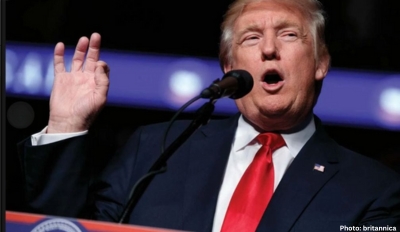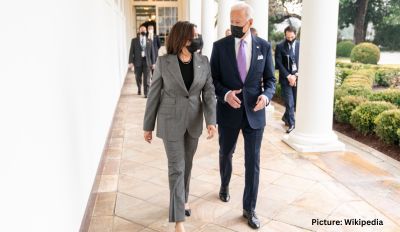With the Taliban back in power in Afghanistan, Pakistan may have come closer to achieving its long-sought “strategic depth” with respect to its western neighbor, with a Pakistan-friendly government in Kabul. But the Taliban’s victory is also seriously testing Pakistan’s long fraught bilateral relationship with America. For the last 20 years, U.S.-Pakistan relations have been defined by the needs of the U.S. war in Afghanistan. With that war having ended with an outcome as ignominious as a Taliban takeover, the relationship is at a clear crossroads. The outlook isn’t positive. Here’s where things stand.
The Mood In Washington
 In Washington, where policymakers have been grappling with the fallout from the sudden Taliban takeover of Kabul in August and the scrambled evacuation that followed, the focus has shifted to identifying the mistakes made in the war in Afghanistan. Washington is taking a hard look at where things went wrong — and Pakistan, given its long history with the Taliban, is part of that equation.
In Washington, where policymakers have been grappling with the fallout from the sudden Taliban takeover of Kabul in August and the scrambled evacuation that followed, the focus has shifted to identifying the mistakes made in the war in Afghanistan. Washington is taking a hard look at where things went wrong — and Pakistan, given its long history with the Taliban, is part of that equation.
In congressional hearings a couple of weeks ago on Afghanistan, U.S. Chairman of the Joint Chiefs of Staff General Mark Milley said that “we need to fully examine the role of Pakistan sanctuary” in understanding how the Taliban prevailed. In September, U.S. Secretary of State Antony Blinken similarly said during his congressional hearing that “This is one of the things we’re going to be looking at in the days, and weeks ahead — the role that Pakistan has played over the last 20 years.” He added that the U.S. government would also be looking at “the role we would want to see [Pakistan] play in the coming years and what it will take for it to do that,” signifying that a review of how to engage Islamabad in the future was ongoing.
In the Senate, 22 Republican lawmakers have proposed a bill calling for Afghanistan’s new Taliban government to be sanctioned, along with governments that have supported the Taliban. The bill also calls for a report that will include “an assessment of support by state and non-state actors, including the government of Pakistan, for the Taliban between 2001 and 2020,” that also looks at the provision of “sanctuary space, financial support, intelligence support, logistics and medical support, training, equipping, and tactical, operation or strategic direction.”
What Pakistan Is Saying
Pakistan’s Senate in turn displayed “alarm” over the bill moved in the U.S. Senate, which Pakistan’s media termed an “anti-Pakistan” bill. Pakistan argues that it is being scapegoated for U.S. military and Afghan leadership failures — while ignoring its own support of the Taliban. It has not officially recognized the new Taliban regime, but it has been concertedly pitching engagement with it, with government officials making the case in speeches, op-eds, and interviews.
In his speech to the U.N. General Assembly, Pakistani Prime Minister Imran Khan went beyond calls many have made for humanitarian relief and financial liquidity to avoid economic collapse in Afghanistan, to saying that “we must strengthen and stabilize the current government, for the sake of the people of Afghanistan.” (Pakistan also points out that instability and violence in Afghanistan will spill over into Pakistan.)
But Pakistan faces a credibility issue, and its call for the world to engage with the Taliban may have found more takers if it had not given the Taliban sanctuary or support over the last 20 years. As it is, these calls only highlight Pakistan’s long-standing ties with the Taliban. And Pakistan’s stance seems to argue for international support before the Taliban fulfill promises they have made regarding girls’ education and human rights.
What America Wants From Pakistan
America wants to ensure that Pakistan doesn’t formally recognize the Taliban government, and that it exercises its leverage over the Taliban to get the group to make concessions on women’s rights and girls’ education, and to form an inclusive government. (So far, the Taliban’s interim cabinet is all male, and beyond some diversity of ethnicity, entirely non-inclusive.)
Going ahead, America also wants to continue to cooperate with Pakistan on certain counterterrorism matters — especially now that it is limited to “over the horizon” operations in Afghanistan. General Frank McKenzie, the commander of U.S. Central Command, alluded to that in his congressional testimony: “Over the last 20 years we’ve been able to use what we call the air boulevard to go in over western Pakistan and that’s become something that’s vital to us, as well as certain landlines of communication. And we’ll be working with the Pakistanis in the days and weeks ahead to look at what that relationship is going to look like in the future.” The general was referring to air lines of communication (ALOCs) and ground lines of communication (GLOCs) that Pakistan provided to the U.S. over the last 20 years.
Recent Engagement From The Biden Administration With Pakistan
The Biden administration’s engagement with Pakistan to date — pre- and post-withdrawal — has focused almost exclusively on Afghanistan. Central Intelligence Agency Director William Burns visited Pakistan in September, ostensibly to discuss counterterrorism cooperation as well as other matters. Blinken and Pakistani Foreign Minister Shah Mahmood Qureshi had their first in-person meeting on the sidelines of the U.N. General Assembly in New York, and the focus was on Afghanistan.
The readout of the meeting from the State Department was unmistakably bare bones and focused singularly on Afghanistan, but Pakistan’s Ministry of Foreign Affairs’ longer readout also noted Pakistan’s “desire for a balanced relationship with the United States that was anchored in trade, investment, energy and regional connectivity.” This imbalance revealed a disconnect in their views of the relationship.
U.S. Deputy Secretary of State Wendy Sherman visited Pakistan last week. In an interview in India just before the visit, she said: “It’s for a very specific and narrow purpose, we don’t see ourselves building a broad relationship with Pakistan. And we have no interest in returning to the days of hyphenated India, Pakistan.” While in Pakistan, where she met Qureshi; Pakistan’s chief of army staff, Qamar Javed Bajwa; and the Pakistani national security adviser, Moeed Yusuf, Sherman was more diplomatic.
She noted that “Afghanistan was at the top of our agenda, but we also discussed our cooperation in other areas, including the climate crisis, geoeconomics and regional connectivity, and ending the COVID-19 pandemic” and added that “the United States believes that a strong, prosperous, democratic Pakistan is vitally important for the region and indeed for the wider world.”
Hanging over these meetings is the fact that Biden has not yet called Khan since he took office in January. The glaring lack of a phone call is a topic of considerable discussion in Pakistan.
Warning Signs
Many in Pakistan watching this phase of the U.S.-Pakistan relationship are evoking the end of the Soviet-Afghan war, when the U.S., after having allied with Pakistan to fund and arm the mujahideen that Pakistan trained to fight the Soviets, looked away from the region. America eventually sanctioned Pakistan for its nuclear weapons program.
Over the last 20 years, Washington’s needs in Afghanistan defined the U.S.-Pakistan relationship, even if that meant Washington sometimes had to turn a blind eye to Pakistan’s sanctuary for the Taliban. Now, after the withdrawal from Afghanistan, Washington has little incentive to gloss over what it has long seen as Pakistan’s double game or to broaden ties. Washington’s attention is now east of Pakistan: on its relationships with India and other countries to counter China.
In this environment, U.S.-Pakistan relations face a reckoning.
The U.S. withdrawal from Afghanistan might have been a moment of opportunity to rethink a bilateral relationship that has been defined for much of the last 40 years by Pakistan’s western neighbor. But in early August, I wrote that the relationship between America and Pakistan stood in an uneasy limbo as the U.S. was withdrawing from Afghanistan; and that there would be “little to no appetite in Washington to engage with Pakistan on other matters going ahead if Afghanistan was embroiled in violence or in Taliban hands.”
The latter outcome has come to pass. Warning signs are flashing red for the U.S.-Pakistan relationship, and it’s safe to say that the scope for cooperation has narrowed. Sherman may not have been engaging in diplo-speak on Pakistan while in India, but she may have given away where the Biden administration is leaning for now on Pakistan: limited engagement on Afghanistan, and little else.
(Madiha Afzal is a Fellow – Foreign Policy, Center for Middle East Policy, Center for Security, Strategy, and Technology)











